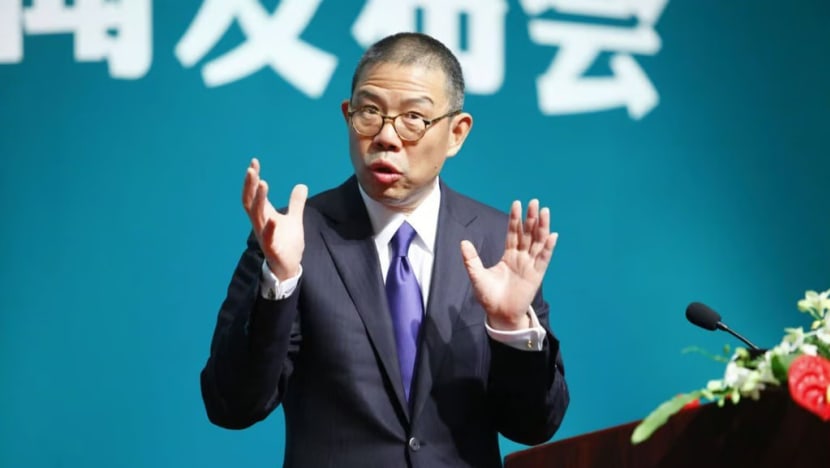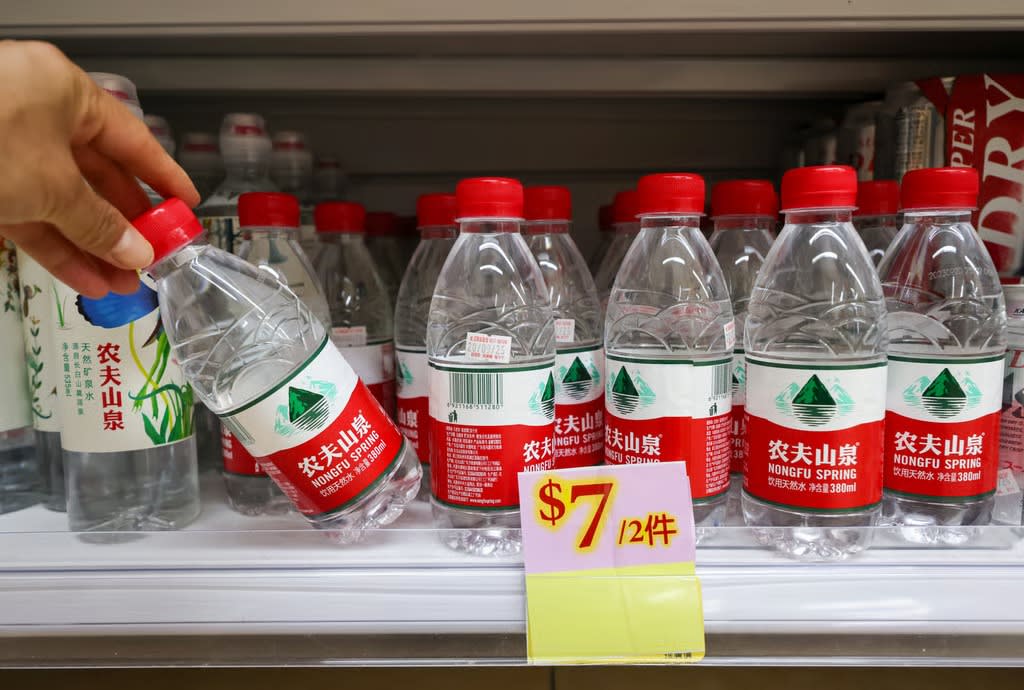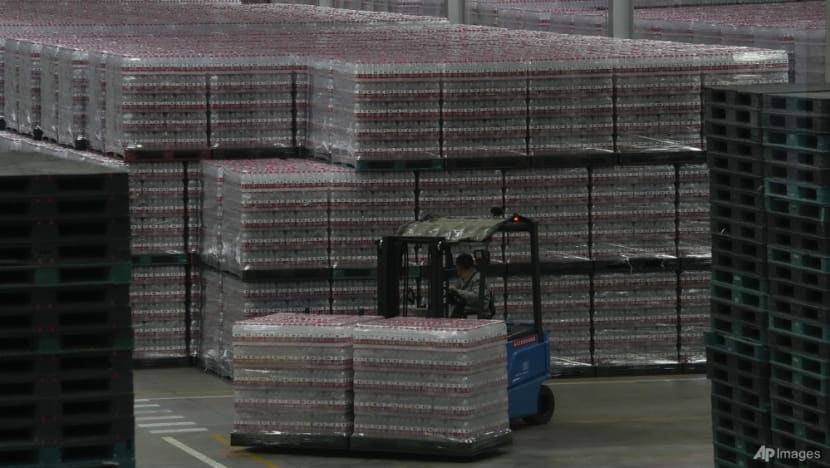Troubled waters: Chinese tycoon’s US beverage plant bid sparks national security alarm
China’s richest man, Zhong Shanshan, has come under scrutiny in the small northeastern US state of New Hampshire, home to just more than 1 million residents, over a plan to develop an industrial site in the state’s second-largest city, Nashua.
The controversy began in May when it emerged that a US subsidiary of Zhong’s firm Nongfu Spring, NF North America, had quietly acquired a single-storey building on a 9.3ha industrial site in Nashua in January.
The site had been abandoned for nearly 11 years, and the company planned to build a beverage plant and purchase the city’s surplus water for its operations.
“Chinese billionaire wants NH water,” declared a local news headline that month. Zhong founded Nongfu Spring, now China’s largest beverage company. His net worth is estimated at US$64 billion.
Unlike earlier large Chinese investments that might have been unremarkable before China became synonymous with national security threats to US policymakers left and right, NF North America’s prospects now appear uncertain.
Likewise, similar deals, including battery giant Gotion, CATL’s partnership with Ford, and agribusiness firm Fufeng, have been stalled entirely in recent years or face mounting scrutiny. As US President Donald Trump’s trade team negotiates with Beijing in hopes of striking a deal by Aug 11 and easing tensions, the controversy over Nongfu Spring’s property purchase in New Hampshire underscores the limits of such efforts.
While a trade agreement may reduce tariff burdens, experts say it cannot resolve the deeper issue of political mistrust that continues to strain US-China relations.
The US$67 million Nongfu purchase, more than four times the site’s assessed value of US$15 million, quickly drew attention.

The site’s steep purchase price and location near critical infrastructure, including a watershed area that supplies drinking water for the city, defence contractor BAE Systems, and a federal aviation control centre, sparked concern among local residents and lawmakers.
A bill restricting land sales near military installations to entities from “foreign adversaries”, including China, had previously stalled in the state’s legislature.
The Nongfu case, however, revived the issue’s political momentum, spurring lawmakers to incorporate the measure into the state budget, which passed in June. The new law also grants the attorney general authority to seek forfeiture of any such property.
Now, some state Republican leaders are calling for further scrutiny. They are pushing for both state-level enforcement and an investigation by the federal Committee on Foreign Investment in the United States, also known as CFIUS - a US Treasury Department-led body able to review and possibly cancel this purchase on national security grounds.
Meanwhile, plans to build a beverage plant on the site appear stalled. Some locals argue that selling surplus city water to a private company could lower public water bills.
But the conversation in social media and local news reports has shifted to speculation over why a Chinese billionaire is interested in an abandoned property, fuelling rumours of a Chinese takeover of local water resources.
According to Chris Pereira, CEO of iMpact, a New York-based consultancy that helps Chinese firms in their global operations, “the fact that Zhong is China’s richest man makes this story far more politically charged”.
He said that in the current geopolitical environment, “linking a major land acquisition to a prominent Chinese billionaire, especially one in a strategic sector like water, adds fuel to public scepticism and political posturing”.
“The price paid for the land only adds to the perception that ‘something must be going on’, even if the purchase is commercially justified,” Pereira added, saying these elements “create an optics problem more than a substance problem”.
The Nashua Planning Department told the South China Morning Post (SCMP) that the company’s application to establish a beverage-manufacturing facility was withdrawn in late May, and no active or open application is under consideration.
The city has emphasised that it was neither involved in nor informed about the property sale, as it was a private transaction.
John Boisvert, CEO of Pennichuck Corp, a semi-private water company controlled by the city that serves about 40,000 customers using water from the Pennichuck watershed and the Merrimack River, said routine due diligence meetings were held by local authorities on the company’s proposal to set up a plant and buy water from Pennichuck between October and December.
After saying yes, though, Pennichuck has not heard back from NF North America on “the next steps”.

Boisvert said there has been a lot of misreporting on the issue, especially some claims about Nongfu trying to take over the Pennichuck water system.
“It was reported that, which is completely inaccurate, that we are selling ourselves to this company. It’s not the case,” he told SCMP in an interview.
Boisvert said Pennichuck has the capacity to sell surplus water to private investors who pay for necessary infrastructure, which could lower consumer costs, although there is no guarantee of bill reductions.
The cost, “in theory, could go down”, he said.
However, state Republican lawmakers argue that Nongfu has yet to address a number of unresolved questions.
In a joint statement released on Jul 17, state Senators Kevin Avard and Regina Birdsell, co-sponsors of the bill to block Chinese entities from purchasing land near military installations, vowed to continue opposing the Nongfu deal.
Birdsell said the latest case shows that “our foreign adversaries are very interested in acquiring US land”, adding that had her bill been passed last year, “this purchase in Nashua would never have happened”.
She pledged to “continue bringing attention to this important matter so that our critical infrastructures are not compromised” and that all New Hampshire residents are “safe from foreign threats”.
Avard said “there are many unanswered questions about this deal”, and that he found it “disconcerting that city officials in Nashua allowed this deal to be approved so quickly without a public conversation”.
“The land purchase is close to a number of defence contractors in our state, such as BAE in Nashua, and within 14 miles of the New Boston Space Force station,” he said, adding that military personnel from the US Space Force had come to “Concord this year to testify about real attempts to steal intelligence in New Hampshire”.
Avard appeared, in an opinion piece run by a local publication in June, to link the deal with possible agriculture terrorism, citing the arrest of two Chinese nationals in Michigan that month for allegedly smuggling what the US Justice Department called a “dangerous biological pathogen”.
“Nashua is the first city to grant a domestic water contract to Nongfu Spring, with Nongfu announcing plans to expand aggressively in America by gaining access to our tap water for bottling operations,” he asserted.
Avard also called on CFIUS “to abrogate this contract that potentially threatens our national interests”.
“Any company subject to CCP (China's Communist Party) influence that has access to America’s food or water supply ought to qualify for debarment,” he said, adding that he has not heard back from the investment review board.
Avard has also criticised US Representative Maggie Goodlander, a Democrat who represents New Hampshire’s Second District, which includes Nashua. Goodlander is married to Jake Sullivan, former US President Joe Biden’s national security adviser.
“Goodlander is intent on criticising Trump’s China tariffs and Trump’s revocation of visas for Chinese students. Concern over selling access to our water supply? Crickets,” he wrote in his opinion piece.
Neither Birdsell nor Avard responded to a request for comment from SCMP. Nongfu also did not respond over these concerns. No official website could be found for NF North America, though public records show the company is registered in Delaware.
Last week, the Hodge twins, brothers Keith and Kevin Hodge - conservative commentators known as the “Conservative Twins” with nearly 6.5 million followers on Facebook - also weighed in on the case through their social media channels.
“One of China’s richest men, Zhong Shanshan, just bought US$67 million worth of New Hampshire land at FOUR TIMES its assessed value,” the post said.
It asked why the “CCP” was “buying up land near critical US utilities and sensitive sites.”
Their post lauded Avard and Birdsell for “raising the alarm”.
Some New Hampshire residents have been posting their concerns on social media groups as well, raising similar concerns about the company’s alleged links to the CCP and calling for a reversal of the deal.
This is not the first time a Chinese company has found itself at the eye of a storm in the US. In 2022, a Chinese agribusiness project was cancelled despite CFIUS clearance because it was close to a military facility.
Two battery plants by a US subsidiary of China’s Gotion have been mired in legal troubles because of public and political opposition in Michigan and Illinois.
The battery plants became an election issue last year, with then-vice-presidential candidate JD Vance himself conducting a rally in the town where the plant is proposed to be built.
Trump has also opposed the project despite telling foreign companies to build factories in the US to avoid tariffs.
“I think it’s possible that Nongfu becomes the next casualty in a pattern that’s becoming more common. Even if there’s no wrongdoing, the risk of politicisation alone can delay, derail, or discourage a project entirely,” Pereira said.
For Nongfu, he added, “this could mean shelving or re-routing its US expansion plans, or rethinking how it enters foreign markets more broadly.”

“Companies like Nongfu will increasingly need to invest not just in factories, but in local trust-building, public engagement, and strategic communications; otherwise their investments may never get off the ground, no matter how commercially viable they are,” Pereira said.
A survey of 100 Chinese companies by the China General Chamber of Commerce in April found widespread pessimism about future investment in the US under the second Trump administration.
The companies identified a wide range of expected challenges to their US operations this year and next, with 90 per cent citing the stalemate in bilateral political and cultural relations, 73 per cent pointing to frictions in economic and trade ties, and 60 per cent flagging restrictive US foreign investment policies.
Even as the US and China agreed at trade talks in Sweden this week to seek an extension of their 90-day tariff truce while pledging to continue to talk to address their differences, Pereira said that “a trade deal may help ease tariff burdens, but it’s unlikely to solve the deeper issue, which is political trust, or lack thereof”.
“What we’re seeing now isn’t primarily about trade policy”, he added, saying the Nongfu case “illustrates that the challenges are now more reputational and political than transactional”.
This article was first published on SCMP.
免責聲明:投資有風險,本文並非投資建議,以上內容不應被視為任何金融產品的購買或出售要約、建議或邀請,作者或其他用戶的任何相關討論、評論或帖子也不應被視為此類內容。本文僅供一般參考,不考慮您的個人投資目標、財務狀況或需求。TTM對信息的準確性和完整性不承擔任何責任或保證,投資者應自行研究並在投資前尋求專業建議。
熱議股票
- 1
- 2
- 3
- 4
- 5
- 6
- 7
- 8
- 9
- 10